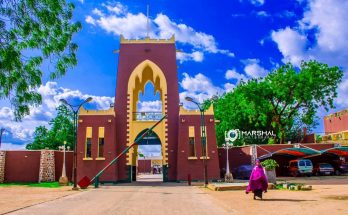In a democratic journey of four years, it will be exceedingly hasty to evaluate one’s success or failure in using the first six months of that journey as a yardstick. Nonetheless, we must do as the Hausa adage, ‘Jumma’a mai kyau daga Laraba ake gane ta’ suggests, to look out for the signs of a potentially prosperous Friday from Wednesday. This may sound overly optimistic, but I believe it is normal, especially in the Nigerian context to begin our search for markers of astute leadership very early in the life of the tenure of our leaders; to critically evaluate their stewardship and see if it is worth the investment of our collective hopes and aspirations.
This progressive litmus testing is even more important in this day and age when some obdurate politicians come to power armed to the teeth with leprous fingers sharpened for the pursuit of lucre. The purpose of these unfortunate leaders is the building of criminal financial base at the expense of a hapless, beggarly citizenry who are always left to rue their electoral choice at the end of every social contract. Leaving the people in the lurch and holding the short end of the stick has become a very bitter part of Nigeria’s democratic journey.
Although, the situation appears bleak, there are a few whose astuteness, steadfastness and dedication to the delivery of their mandate have been nothing short of exemplary. Though few and far in-between, this class of leaders are busy making a difference by rewriting the narrative of an already battered reality, thereby returning the hitherto lost confidence back to their people.
Governor Nasiru Idris (Kauran Gwandu) of Kebbi state embodies the persona of latter group of leaders. Since his emergence as the governor of the state on March 18, 2023, he has been making frantic efforts to dispense dividends of democracy to the people of the state via all sectors of the state’s economy amidst the glaring challenges of insecurity, paucity of funds and other inherited liabilities threatening to clog the wheel of development.
He has been described as a non-conformist for distancing himself from the unwritten tradition of governors faffing around and gallivanting in the corridors of Abuja without genuine reason while their people are left at the mercy of the elements. In a display of servant leadership, Kaura has been spending most of his time in Kebbi state discharging his sworn obligations as the chief security officer of the state, and using the time to cut for himself an early reputation as the infrastructural transformer.
The bonding time with his people has also given a direct feel of the hardship that they have been plunged into since President Bola Tinubu announced the removal of fuel subsidy in his inaugural speech. It goes without saying that the people of Kebbi, like the rest of Nigeria, were thrown into sudden economic turmoil and hardship. Whereas the cries of anguish are intensifying across the nation, the people of Kebbi appear to have a good bargain, thanks to the welfarism governance model of Kaura.
The economic situation requires deep levels of strong commitment by the leaders to arrest the slide and feelers from Kebbi show that Governor Kaura has demonstrated the aforementioned qualities and more. His swift and immediate measures carefully designed to headrest the effects of subsidy removal have been a game changer for the people of Kebbi state.
While many leaders wasted so much punching holes on the premise upon which the president ended the subsidy regime, Governor Kaura understood the desire of the president to better the lives of all Nigerians devoid of any political, religious, or ethnic considerations. And it was on the strength of this that he swiftly commenced the distribution of palliatives worth over N5.7bn to the vulnerable in the state. The flag-off of palliative distribution was held in Maiyama local government area of the state. At the end of the exercise, over 720,000 families from across all 21 local government areas of the state were reached by the transparent distribution of economic relief items.
Unlike other states that depended solely on federal government intervention to distribute palliatives, the over 210 truckloads of grains worth N5.7 billion distributed to the vulnerable to cushion the effect of fuel subsidy removal and provide sustainable means of livelihood to citizenry came from state coffers. In the thoroughly transparent exercise, each of the 21 local government areas got 10 trucks of grains; rice and millet which are the most commonly consumed foods by the citizens.
In a bid to leave nothing to chance and ensure equitable and judicious distribution of the palliatives, making sure only the indigent are impacted by the initiative, Governor Kaura constituted a special purpose committee comprising state executive council members, local government party chairmen, representatives of youth leaders, various security agencies, and other critical stakeholders in the state to handle the exercise. This no doubt was a demonstration of the governor’s commitment towards the running of an inclusive and open government.
Also, in his bid to diversify the state’s economy to agriculture, the governor announced a series of initiatives in collaboration with the federal government to mainstream a special Dry Season farming initiative for the 2023/2024 farming season. Without making it too obvious, the programme is billed to provide a solid, lasting, and sustainable means of livelihood to the citizenry all through the dry season.
This makes a lot of sense, considering Kebbi state is one of the foremost states in the North-west zone known for deep engagement in agriculture and its value chain. Kaura has pledged to support farmers to fully maximise the dry season to cultivate crops that’ll not only reduce hunger levels to the barest minimum in the state, but also contribute meaningfully to the state’s internally generated revenue.
No wonder, the multifarious programme is bearing numerous benefits, some of which are the promise of subsidised inputs to prospective farmers and solar irrigation pumps for the cultivation of rice, wheat, maize, and cassava in the dry season. Kaura has, in matching his action with words of encouragement, called on all genuine farmers in the state to enroll into the programme to cultivate the crop of their choice so as to contribute to the food basket of the country.
This massive intervention in agriculture and human capital development was part of Governor Idris’ campaign promises and it’s comforting to see that he has since started translating them from mere promises to reality. A critical aspect of that commitment of security and on the strength of the evidence on ground, the governor’s doggedness appears to be bearing fruits as farmers have been going about cultivating their farm lands without any fear. What more, the governor’s commitment towards improving access to fertiliser to help farmers record higher yield has been a confidence booster to farmers. The governor has since matched words with action by procuring and distributing over 6,720 tons of assorted fertilider worth over N2.3 billion free to farmers in the state.
Governor Idris has had a very eventful six months in office, indeed. His leadership credentials were tested by the grumbling and pains that followed subsidy removal. But, like a phoenix raising the ashes of kindling fire, he navigated the problem with panache. And as other governors are busy still patting themselves in the back for meeting the people at their lowest point of needs, Governor Idris has since moved on to other areas of impact.
These include security, education, road construction and lots more. No wonder, the people of Kebbi overwhelmingly elected to sign a social contract with him during the 2023 governorship election and also stood by him through the legal battles to ratify their mandate. With what he has achieved within just some months, Kaura is poised to change the leadership narrative in the state for the better.
Musa writes from Yawuri, Kebbi state




